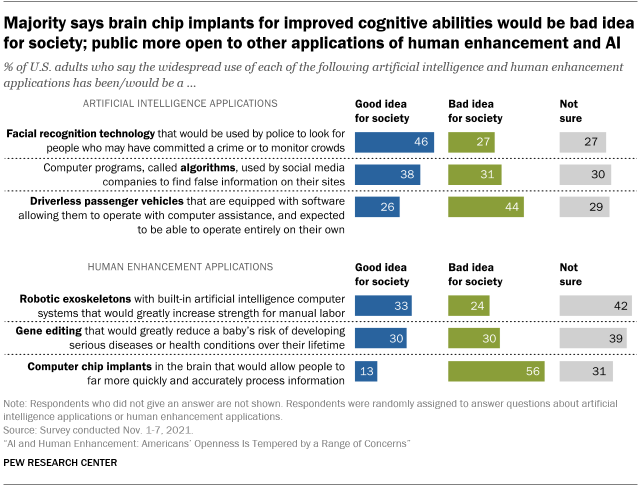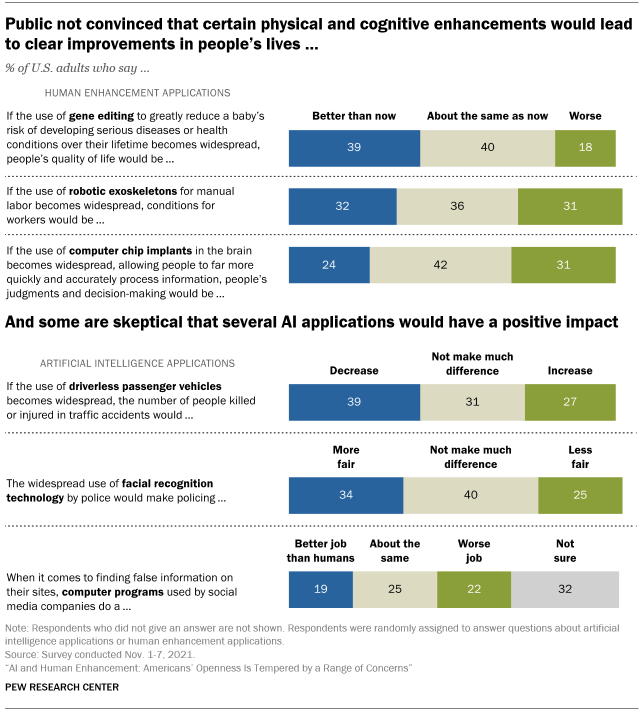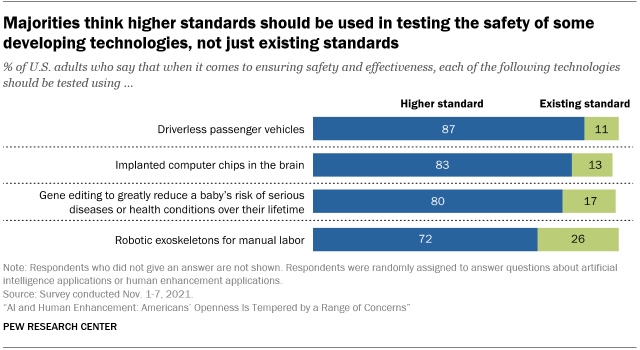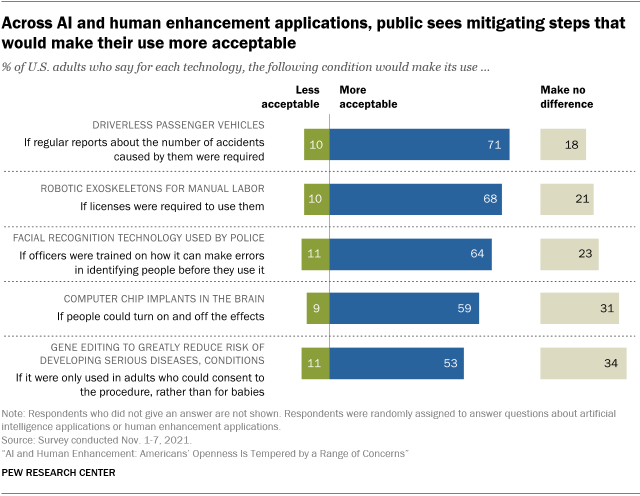Americans regard advances in artificial intelligence and human enhancement technologies with a degree of caution and uncertainty.
A new Pew Research Center report looks in depth at three of the growing number of AI applications: the use of facial recognition by police, the use of computer algorithms by social media companies to find false information on their sites and a future with driverless passenger vehicles. It also explores three developments tied to the convergence of AI, biotechnology, nanotechnology and other fields that raise the possibility of dramatic changes to human abilities in the future: computer chip implants in the brain to advance people’s cognitive skills, gene editing to greatly reduce a baby’s risk of developing serious diseases or health conditions, and robotic exoskeletons with a built-in AI system to greatly increase strength for lifting in manual labor jobs.
Americans’ wariness about this wide arc of emergent developments runs through many of the survey’s findings. This wariness often centers on concerns about whether people would retain control of their lives, possible unanticipated impacts as these technologies become widely available, and uneasiness about how far these advances might go in changing fundamental human traits and social realities. Some remain uncertain of where they stand on these developments, and about half or more see restrictions on their use that would make them more acceptable.
The survey of 10,260 U.S. adults was conducted between Nov. 1 and 7, 2021. Here are five key themes that run through people’s answers on these questions.
Americans’ judgments about the potential impact of this set of applications are varied and, for portions of the public, marked by uncertainty. Far more Americans anticipate positive than negative effects from the widespread use of facial recognition technology by police to monitor crowds and look for people who may have committed a crime: 46% think this would be a good idea for society, while 27% think this would be a bad idea and another 27% are unsure. By narrower margins, more describe the use of computer algorithms by social media companies to find false information on their sites as a good rather than a bad idea for society (38% to 31%).
 https://www.pewresearch.org/wp-content/uploads/2022/03/ft_2022.03.17_AIHEtakeaways_01.png?resize=300,228 300w, https://www.pewresearch.org/wp-content/uploads/2022/03/ft_2022.03.17_AIHEtakeaways_01.png?resize=768,583 768w, https://www.pewresearch.org/wp-content/uploads/2022/03/ft_2022.03.17_AIHEtakeaways_01.png?resize=1024,778 1024w, https://www.pewresearch.org/wp-content/uploads/2022/03/ft_2022.03.17_AIHEtakeaways_01.png?resize=160,122 160w, https://www.pewresearch.org/wp-content/uploads/2022/03/ft_2022.03.17_AIHEtakeaways_01.png?resize=533,405 533w, https://www.pewresearch.org/wp-content/uploads/2022/03/ft_2022.03.17_AIHEtakeaways_01.png?resize=200,152 200w, https://www.pewresearch.org/wp-content/uploads/2022/03/ft_2022.03.17_AIHEtakeaways_01.png?resize=260,197 260w, https://www.pewresearch.org/wp-content/uploads/2022/03/ft_2022.03.17_AIHEtakeaways_01.png?resize=310,235 310w, https://www.pewresearch.org/wp-content/uploads/2022/03/ft_2022.03.17_AIHEtakeaways_01.png?resize=420,319 420w, https://www.pewresearch.org/wp-content/uploads/2022/03/ft_2022.03.17_AIHEtakeaways_01.png?resize=640,486 640w, https://www.pewresearch.org/wp-content/uploads/2022/03/ft_2022.03.17_AIHEtakeaways_01.png?resize=740,562 740w" sizes="(max-width: 1280px) 100vw, 1280px" style="box-sizing:inherit;border-style:none;height:auto;max-width:100%;vertical-align:bottom;border-radius:inherit">
https://www.pewresearch.org/wp-content/uploads/2022/03/ft_2022.03.17_AIHEtakeaways_01.png?resize=300,228 300w, https://www.pewresearch.org/wp-content/uploads/2022/03/ft_2022.03.17_AIHEtakeaways_01.png?resize=768,583 768w, https://www.pewresearch.org/wp-content/uploads/2022/03/ft_2022.03.17_AIHEtakeaways_01.png?resize=1024,778 1024w, https://www.pewresearch.org/wp-content/uploads/2022/03/ft_2022.03.17_AIHEtakeaways_01.png?resize=160,122 160w, https://www.pewresearch.org/wp-content/uploads/2022/03/ft_2022.03.17_AIHEtakeaways_01.png?resize=533,405 533w, https://www.pewresearch.org/wp-content/uploads/2022/03/ft_2022.03.17_AIHEtakeaways_01.png?resize=200,152 200w, https://www.pewresearch.org/wp-content/uploads/2022/03/ft_2022.03.17_AIHEtakeaways_01.png?resize=260,197 260w, https://www.pewresearch.org/wp-content/uploads/2022/03/ft_2022.03.17_AIHEtakeaways_01.png?resize=310,235 310w, https://www.pewresearch.org/wp-content/uploads/2022/03/ft_2022.03.17_AIHEtakeaways_01.png?resize=420,319 420w, https://www.pewresearch.org/wp-content/uploads/2022/03/ft_2022.03.17_AIHEtakeaways_01.png?resize=640,486 640w, https://www.pewresearch.org/wp-content/uploads/2022/03/ft_2022.03.17_AIHEtakeaways_01.png?resize=740,562 740w" sizes="(max-width: 1280px) 100vw, 1280px" style="box-sizing:inherit;border-style:none;height:auto;max-width:100%;vertical-align:bottom;border-radius:inherit">By contrast, the public is far more hesitant about a future with widespread use of computer chip implants in the brain to allow people to far more quickly and accurately process information: 56% say this would be a bad idea for society, while just 13% think this would be a good idea. And more see the prospect of widespread use of driverless cars in the future as a bad (44%) rather than good idea (26%) for society. Still, roughly three-in-ten or more Americans are uncertain about the societal impact from each of these six developments.
Less than half of the public believes these technologies would improve things over the way they are now. One of the factors tied to Americans’ largely cautious take on these new and emerging developments stems from doubt that these potential human enhancements would make life better than it is now or that reliance on AI would improve on human judgment or performance. On these questions, less than half of the public is convinced improvements would result. For example, 32% of Americans think that robotic exoskeletons with built-in AI systems to increase strength for manual labor would generally lead to improved working conditions, while 36% think their use would not make much difference and 31% say they would make working conditions worse.
 https://www.pewresearch.org/wp-content/uploads/2022/03/ft_2022.03.17_AIHEtakeaways_02.png?resize=270,300 270w, https://www.pewresearch.org/wp-content/uploads/2022/03/ft_2022.03.17_AIHEtakeaways_02.png?resize=768,853 768w, https://www.pewresearch.org/wp-content/uploads/2022/03/ft_2022.03.17_AIHEtakeaways_02.png?resize=922,1024 922w, https://www.pewresearch.org/wp-content/uploads/2022/03/ft_2022.03.17_AIHEtakeaways_02.png?resize=160,178 160w, https://www.pewresearch.org/wp-content/uploads/2022/03/ft_2022.03.17_AIHEtakeaways_02.png?resize=365,405 365w, https://www.pewresearch.org/wp-content/uploads/2022/03/ft_2022.03.17_AIHEtakeaways_02.png?resize=200,222 200w, https://www.pewresearch.org/wp-content/uploads/2022/03/ft_2022.03.17_AIHEtakeaways_02.png?resize=260,289 260w, https://www.pewresearch.org/wp-content/uploads/2022/03/ft_2022.03.17_AIHEtakeaways_02.png?resize=310,344 310w, https://www.pewresearch.org/wp-content/uploads/2022/03/ft_2022.03.17_AIHEtakeaways_02.png?resize=420,467 420w, https://www.pewresearch.org/wp-content/uploads/2022/03/ft_2022.03.17_AIHEtakeaways_02.png?resize=640,711 640w, https://www.pewresearch.org/wp-content/uploads/2022/03/ft_2022.03.17_AIHEtakeaways_02.png?resize=740,822 740w" sizes="(max-width: 1280px) 100vw, 1280px" style="box-sizing:inherit;border-style:none;height:auto;max-width:100%;vertical-align:bottom;border-radius:inherit">
https://www.pewresearch.org/wp-content/uploads/2022/03/ft_2022.03.17_AIHEtakeaways_02.png?resize=270,300 270w, https://www.pewresearch.org/wp-content/uploads/2022/03/ft_2022.03.17_AIHEtakeaways_02.png?resize=768,853 768w, https://www.pewresearch.org/wp-content/uploads/2022/03/ft_2022.03.17_AIHEtakeaways_02.png?resize=922,1024 922w, https://www.pewresearch.org/wp-content/uploads/2022/03/ft_2022.03.17_AIHEtakeaways_02.png?resize=160,178 160w, https://www.pewresearch.org/wp-content/uploads/2022/03/ft_2022.03.17_AIHEtakeaways_02.png?resize=365,405 365w, https://www.pewresearch.org/wp-content/uploads/2022/03/ft_2022.03.17_AIHEtakeaways_02.png?resize=200,222 200w, https://www.pewresearch.org/wp-content/uploads/2022/03/ft_2022.03.17_AIHEtakeaways_02.png?resize=260,289 260w, https://www.pewresearch.org/wp-content/uploads/2022/03/ft_2022.03.17_AIHEtakeaways_02.png?resize=310,344 310w, https://www.pewresearch.org/wp-content/uploads/2022/03/ft_2022.03.17_AIHEtakeaways_02.png?resize=420,467 420w, https://www.pewresearch.org/wp-content/uploads/2022/03/ft_2022.03.17_AIHEtakeaways_02.png?resize=640,711 640w, https://www.pewresearch.org/wp-content/uploads/2022/03/ft_2022.03.17_AIHEtakeaways_02.png?resize=740,822 740w" sizes="(max-width: 1280px) 100vw, 1280px" style="box-sizing:inherit;border-style:none;height:auto;max-width:100%;vertical-align:bottom;border-radius:inherit">Another concern for Americans is tied to the potential impact of these emerging technologies on social equity. For instance, 57% of Americans say the widespread use of brain chips for enhanced cognitive function would increase the gap between higher- and lower-income Americans, while just 10% say it would decrease the gap. There are similar patterns in views about the widespread use of driverless cars and gene editing for babies to greatly reduce the risk of serious disease during their lifetime.
Views are also tied to people’s sense of how these technologies would be used and who might benefit or be harmed by their rollout. About two-thirds (66%) of Americans think the widespread use of facial recognition technology by the police would lead them to monitor surveillance of Black and Hispanic neighborhoods much more often than other neighborhoods.
Americans see a need for higher standards to assess the safety of technologies on the horizon than are currently used. The public largely agrees when it comes to standards for ensuring the safety and effectiveness of technologies still in development. Across the four of these technologies in the survey, large majorities support the idea that higher standards should be applied, rather than the standards that are currently the norm. About nine-in-ten Americans (87%) say that higher standards for testing driverless cars should be in place, rather than using existing standards for passenger cars. And 83% believe the testing of brain chip implants should meet a higher standard than is currently in use to test medical devices.
 https://www.pewresearch.org/wp-content/uploads/2022/03/ft_2022.03.17_AIHEtakeaways_03.png?resize=300,164 300w, https://www.pewresearch.org/wp-content/uploads/2022/03/ft_2022.03.17_AIHEtakeaways_03.png?resize=768,420 768w, https://www.pewresearch.org/wp-content/uploads/2022/03/ft_2022.03.17_AIHEtakeaways_03.png?resize=1024,560 1024w, https://www.pewresearch.org/wp-content/uploads/2022/03/ft_2022.03.17_AIHEtakeaways_03.png?resize=160,88 160w, https://www.pewresearch.org/wp-content/uploads/2022/03/ft_2022.03.17_AIHEtakeaways_03.png?resize=741,405 741w, https://www.pewresearch.org/wp-content/uploads/2022/03/ft_2022.03.17_AIHEtakeaways_03.png?resize=200,109 200w, https://www.pewresearch.org/wp-content/uploads/2022/03/ft_2022.03.17_AIHEtakeaways_03.png?resize=260,142 260w, https://www.pewresearch.org/wp-content/uploads/2022/03/ft_2022.03.17_AIHEtakeaways_03.png?resize=310,170 310w, https://www.pewresearch.org/wp-content/uploads/2022/03/ft_2022.03.17_AIHEtakeaways_03.png?resize=420,230 420w, https://www.pewresearch.org/wp-content/uploads/2022/03/ft_2022.03.17_AIHEtakeaways_03.png?resize=640,350 640w, https://www.pewresearch.org/wp-content/uploads/2022/03/ft_2022.03.17_AIHEtakeaways_03.png?resize=740,405 740w" sizes="(max-width: 1280px) 100vw, 1280px" style="box-sizing:inherit;border-style:none;height:auto;max-width:100%;vertical-align:bottom;border-radius:inherit">
https://www.pewresearch.org/wp-content/uploads/2022/03/ft_2022.03.17_AIHEtakeaways_03.png?resize=300,164 300w, https://www.pewresearch.org/wp-content/uploads/2022/03/ft_2022.03.17_AIHEtakeaways_03.png?resize=768,420 768w, https://www.pewresearch.org/wp-content/uploads/2022/03/ft_2022.03.17_AIHEtakeaways_03.png?resize=1024,560 1024w, https://www.pewresearch.org/wp-content/uploads/2022/03/ft_2022.03.17_AIHEtakeaways_03.png?resize=160,88 160w, https://www.pewresearch.org/wp-content/uploads/2022/03/ft_2022.03.17_AIHEtakeaways_03.png?resize=741,405 741w, https://www.pewresearch.org/wp-content/uploads/2022/03/ft_2022.03.17_AIHEtakeaways_03.png?resize=200,109 200w, https://www.pewresearch.org/wp-content/uploads/2022/03/ft_2022.03.17_AIHEtakeaways_03.png?resize=260,142 260w, https://www.pewresearch.org/wp-content/uploads/2022/03/ft_2022.03.17_AIHEtakeaways_03.png?resize=310,170 310w, https://www.pewresearch.org/wp-content/uploads/2022/03/ft_2022.03.17_AIHEtakeaways_03.png?resize=420,230 420w, https://www.pewresearch.org/wp-content/uploads/2022/03/ft_2022.03.17_AIHEtakeaways_03.png?resize=640,350 640w, https://www.pewresearch.org/wp-content/uploads/2022/03/ft_2022.03.17_AIHEtakeaways_03.png?resize=740,405 740w" sizes="(max-width: 1280px) 100vw, 1280px" style="box-sizing:inherit;border-style:none;height:auto;max-width:100%;vertical-align:bottom;border-radius:inherit">There are sharp partisan divisions when people think about possible government regulation of these new and developing technologies. Americans are often closely divided in their views of government regulation of these six scientific and technological developments. For example, when it comes to regulating the use of facial recognition technology by police, 47% of Americans say their greater concern is that government regulation will go too far, while 51% instead say their greater concern is that government will not go far enough.
Across all six technologies the survey explored, a majority of Republicans and independents who lean to the Republican Party say they are more concerned about government overreach, while a majority of Democrats and Democratic leaners worry more that there will be too little oversight.
Republicans are more likely than Democrats to say their greater concern is that the government will go too far regulating of the use of facial recognition by police (59% vs. 36%). Conversely, Democrats are more likely than Republicans to say their concern is that government regulation will not go far enough.
People are relatively open to the idea that a variety of actors – in addition to the federal government – should have a role in setting the standards for how these technologies should be regulated. Across all six applications, majorities believe that federal government agencies, the creators of the different AI systems and human enhancement technologies and end users should play at least a minor role in setting standards.
There are mitigating steps people say would make these AI and human enhancement developments more acceptable. One element of public caution in thinking about these six developments is the desire to retain human control over these new and emerging possibilities. Some of the mitigating steps we explored related to the issue of human autonomy. For instance, seven-in-ten Americans say they would find driverless cars more acceptable if there was a requirement that such cars were labeled as driverless so they could be easily identified on the road, and 57% would find driverless cars more acceptable if a licensed driver was required to be in the vehicle.
Similarly, about six-in-ten Americans think the use of computer chip implants in the brain would be more acceptable if people could turn on and off the effects, and 53% would find the brain implants more acceptable if the computer chips could be put in place without surgery.
 https://www.pewresearch.org/wp-content/uploads/2022/03/ft_2022.03.17_AIHEtakeaways_04.png?resize=300,233 300w, https://www.pewresearch.org/wp-content/uploads/2022/03/ft_2022.03.17_AIHEtakeaways_04.png?resize=768,595 768w, https://www.pewresearch.org/wp-content/uploads/2022/03/ft_2022.03.17_AIHEtakeaways_04.png?resize=1024,794 1024w, https://www.pewresearch.org/wp-content/uploads/2022/03/ft_2022.03.17_AIHEtakeaways_04.png?resize=160,124 160w, https://www.pewresearch.org/wp-content/uploads/2022/03/ft_2022.03.17_AIHEtakeaways_04.png?resize=523,405 523w, https://www.pewresearch.org/wp-content/uploads/2022/03/ft_2022.03.17_AIHEtakeaways_04.png?resize=200,155 200w, https://www.pewresearch.org/wp-content/uploads/2022/03/ft_2022.03.17_AIHEtakeaways_04.png?resize=260,202 260w, https://www.pewresearch.org/wp-content/uploads/2022/03/ft_2022.03.17_AIHEtakeaways_04.png?resize=310,240 310w, https://www.pewresearch.org/wp-content/uploads/2022/03/ft_2022.03.17_AIHEtakeaways_04.png?resize=420,326 420w, https://www.pewresearch.org/wp-content/uploads/2022/03/ft_2022.03.17_AIHEtakeaways_04.png?resize=640,496 640w, https://www.pewresearch.org/wp-content/uploads/2022/03/ft_2022.03.17_AIHEtakeaways_04.png?resize=740,574 740w" sizes="(max-width: 1280px) 100vw, 1280px" style="box-sizing:inherit;border-style:none;height:auto;max-width:100%;vertical-align:bottom;border-radius:inherit">
https://www.pewresearch.org/wp-content/uploads/2022/03/ft_2022.03.17_AIHEtakeaways_04.png?resize=300,233 300w, https://www.pewresearch.org/wp-content/uploads/2022/03/ft_2022.03.17_AIHEtakeaways_04.png?resize=768,595 768w, https://www.pewresearch.org/wp-content/uploads/2022/03/ft_2022.03.17_AIHEtakeaways_04.png?resize=1024,794 1024w, https://www.pewresearch.org/wp-content/uploads/2022/03/ft_2022.03.17_AIHEtakeaways_04.png?resize=160,124 160w, https://www.pewresearch.org/wp-content/uploads/2022/03/ft_2022.03.17_AIHEtakeaways_04.png?resize=523,405 523w, https://www.pewresearch.org/wp-content/uploads/2022/03/ft_2022.03.17_AIHEtakeaways_04.png?resize=200,155 200w, https://www.pewresearch.org/wp-content/uploads/2022/03/ft_2022.03.17_AIHEtakeaways_04.png?resize=260,202 260w, https://www.pewresearch.org/wp-content/uploads/2022/03/ft_2022.03.17_AIHEtakeaways_04.png?resize=310,240 310w, https://www.pewresearch.org/wp-content/uploads/2022/03/ft_2022.03.17_AIHEtakeaways_04.png?resize=420,326 420w, https://www.pewresearch.org/wp-content/uploads/2022/03/ft_2022.03.17_AIHEtakeaways_04.png?resize=640,496 640w, https://www.pewresearch.org/wp-content/uploads/2022/03/ft_2022.03.17_AIHEtakeaways_04.png?resize=740,574 740w" sizes="(max-width: 1280px) 100vw, 1280px" style="box-sizing:inherit;border-style:none;height:auto;max-width:100%;vertical-align:bottom;border-radius:inherit">About half or more also see ways that advances would be more acceptable to them when it comes to the use of robotic exoskeletons, facial recognition technology by police and gene editing in babies to greatly reduce the risk of serious disease during their lifetime.
Note: Here are the questions used for this report, along with responses, and its methodology.
























